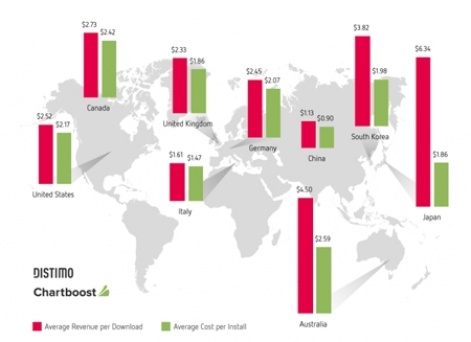James Kaye is a director at digital, mobile & social agency, dimoso.
Something is rotten in the world of mobile games marketing.
I've been marketing mobile games for several years now, and have felt increasingly uneasy as more and more of the companies that approach us for help with launching their games have developed a skewed view of what app marketing is about.
At a recent event in London I chatted candidly to the owners of two large US-based review sites. Asking them about their own sources of revenue, it became clear that they are simply not seeing the same level of investment today from developers and publishers than before.
Scratch the surface and you get the clear sense that the industry's singular obsession with performance-based advertising is at the expense of what should be at the heart of effective marketing - building an emotional engagement with a brand via brand advertising.
Biting the hand that feeds
One of the knock-on effects of this obsession with one form of advertising at the expense of all others means that the commercially-run video game websites that depend on advertising to run effectively simply have no commercial incentive to write about mobile games and the smaller mobile-only sites are increasingly struggling to make ends meet.
Brand building is designed to condition our response to a product and to reinforce the feelings and associations that govern how we make purchasing decisions.
The underlying aim is to 'pull' us into purchasing a particular product. This 'pull' is achieved through marketing at clearly segmented customer types via what is traditionally called the 'marketing mix'; any number of above and below the line channels including TV, radio, PR, social media, online, print, outdoor and experiential.
A sophisticated brand understands the necessity in taking a multi-channel approach to promoting its brand and its key messages.

In the video games industry this is a well trodden path: big publishers such as EA and Activision Blizzard have a sophisticated marketing apparatus in place, coupled with sizeable budgets and a wealth of marketing know-how which enables them to invest heavily in PR and other channels to build their brands outside of performance-based marketing.
Early days?
I completely accept the fact that in marketing terms, the mobile games industry is still finding its feet.
At present, there is a very different level of understanding of what marketing is meant to deliver, and an (unrealistic) expectation that everything has to lead to some kind of immediate response or result.
Many self-publishing coders and developers in particular, fail to realise that marketing as a cost centre cannot always yield an immediate ROI and that it possesses elements that cannot be directly measured. This is why many marketing campaigns end in tears - because developers engage PR agencies to simply secure reviews and are incredibly disappointed when the reviews appear and are favourable, but fail to drive downloads.
This mindset needs to change because it is misguided short-termism, pure and simple.
A positive review may not in itself create a measurable increase in downloads, but it will put your app in front of people who love games, and who may become loyal and vocal fans of your product. It'll even give you some great blurb to put on the app store description and even get you noticed by the app store owners.
Hence my point that mobile games marketing at this point in time is fundamentally broken.
Longterm approach
The fuzzy nature of 'brand building' that is harder, but not impossible, to measure simply does not sit well with developers that have a very limited pot of money. These developers see things in black and white, knowing that if they spend $2.00 they will acquire one customer that they can hopefully monetise for more than the acquisition cost.

Whilst this is very mathematical and does have strong merit it is not a long-term, sustainable strategy. If it were, then many household brands would give it all up tomorrow, stop advertising on TV, billboards and bus shelters and simply do affiliate advertising on the web.
Of course, the product needs to be good in the first place, as even a giant-sized marketing budget can't pull the wool over consumers eyes in an environment where social media and app store reviews can swiftly circumvent carefully crafted marketing messages.
The power of 'databollocks'
A focus on quality can have the knock on effect of generating positive word of mouth, and can even deliver the biggest prize of all - being featured on the app stores. This point was recently highlighted by Fireporoof's Barry Meade - creator of hit game The Room on this very site, with him saying that he's never spent any money on marketing or 'databollocks'.
Barry is completely right, in the sense that he has achieved much-deserved success through a fantastic game. But quality is still not a guarantor of success, and many developers fall by the wayside when Apple or Google fail to feature them and they become lost in the mass of similar apps on the store.
Quality in and of itself does not build brands or sustain a product in the top slot. Coke, Nike, Apple and BMW are all leaders in their fields because they create quality products that people genuinely want and with which they can feel an emotional connection.
With such products quality is a given, as it is inherent in the values of those brands. But however great the quality of their products, these brands know that they still need to continue developing said emotional connections with new and existing customers to drive them to purchase and stay.
More than your next game
Ultimately, this issue of ignoring the benefits of brand-led marketing is both a capability and a maturity issue.
We have an industry that's still learning the best ways to acquire and keep customers, and we're not quite at the stage where the art of brand building is front of mind. But looking around, there are some chinks of light. I really recommend reading this excellent article by Kristian Segersträle, formerly of EA and now Initial Capital, on the future of brand building in mobile.
His wholly measured and analytical approach makes for very good reading, and shows that the issue is coming to the fore. Many people will have also seen King has begun advertising their games on TV which is an indicator in investment in brand building, albeit that they have massively deep pockets.
Performance-based advertising certainly is an incredibly important tool for app developers, and the ability to track, analyse and measure means that building a successful business is a little less about magic, and a bit more about the math.

But in a mature, sophisticated market, real marketing is and should be about so much more than this, and developers would do well to understand that their best customers are also their best fans.
So by all means pump money into pay-per-acquisition advertising; just don't tell me that's all there is to app marketing.




















